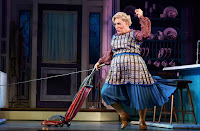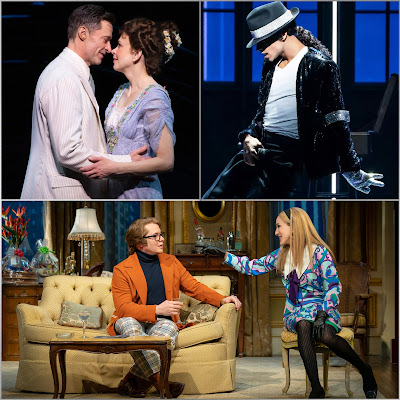Making a good musical is hard. Now I don’t consider that statement to be a conceptual scoop that no one has ever considered before. But the thought has been much on my mind after seeing and being somewhat disappointed by two of the big new musicals that have opened this month.Somewhere near the end of the first act of Paradise Square, the very ambitious Broadway show about the free black people and Irish immigrants who lived in New York’s Five Points neighborhood during the Civil War, my niece Jennifer leaned over and whispered “I am so lost.”
And somewhere near the end of the first act of Suffs, The Public Theater’s very earnest musical that features a cast of female and non-binary performers re-creating the struggle to get American women the right to vote, I found myself wondering “why aren’t I more into this?”
I think the problem for both of these shows is that they’re trying to do too much. Each attempts to juggle 10 or more main characters in multiple storylines. And although set in the past, each also aims to cater to modern sensibilities. It’s somewhat distressing to watch as they strain to carry all that weight.
Paradise Square also bears the extra burden of being the comeback vehicle for producer Garth Drabinksy, whose former company Livent produced Ragtime and other hits back in the ‘90s, until he was accused of financial misdoings, convicted of fraud and forgery and eventually served 17 months of a five-year sentence (click here to read more about that).
But while Ragtime had such veteran show makers as Terrence McNally adapting that musical’s book from the award-winning novel by E.L. Doctorow, Stephen Flaherty composing the score and his partner Lynn Ahrens writing the lyrics, Paradise Square is an original story whose book is credited to three writers, its score to two composers (who the Playbill notes were inspired by a third) and its lyrics to yet two other people. And there are rumors that even more contributors got left off the Playbill title page.
Reports say the show started off as a musical about the white 19th century songwriter Stephen Foster, who is known for such minstrel tunes as “Camptown Races” and “My Old Kentucky Home". But in the final stage version, the focus has shifted to a fictional African-American saloon keeper named Nelly O’Brien.
Nelly has inherited the Paradise Square bar from her father and it’s become a safe place where the races happily mix and mate (she’s married to an Irish immigrant who has enlisted in the Union Army; her Irish sister-in-law is married to a black preacher who is a station master on the Underground Railroad that helps slaves escape to Canada) and everyone competes in friendly dance-offs that pit the step dancing of the Irish against the Juba dancing of the blacks.
But all of that is put in jeopardy when growing numbers of poor whites are reluctantly conscripted to become cannon fodder in the war, while blacks who are eager to fight for black emancipation are denied the right to bear arms.
There’s actually a whole lot more plot (including some stuff about a saintly lesbian couple) but I don’t have the space for it here. And unfortunately director Moisés Kaufman seems to have been as confused as my niece about how to keep track of all of it. The result is a show filled with sketchily drawn characters and spotty storytelling despite a talented cast lead by Joaquina Kalukango as Nelly (click here to read more about her).
It’s still rare for a black performer to get top billing in an interracial cast and Kalukango steps up to the challenge. Her powerfully delivered 11 o’clock number literally brought the audience to its feet at the performance Jennifer and I attended.
Alas, the music isn’t as memorable, except for the legacy melodies by Foster (who I forgot to say is still a character in the show). So the production leans heavily on its dancing, which is credited to the Tony-winning choreographer Bill T. Jones, although the Playbill also gives Alex Sanchez credit for musical staging.
Whoever did what, the dance numbers are fun at first but become less so as the same movements are repeated again and again. And again. In the end, Paradise Square is a victim of too many cooks (including no doubt Drabinsky too) in its creative kitchen, all trying to satisfy differing tastes, too nervous about offending anyone and so ending up with something that is palatable but a little bland.
Unlike Paradise Square, Suffs is the product of a singular vision. Shaina Taub not only wrote the book, musical and lyrics for her show but took on the role of Alice Paul, one of the main strategists in getting the Nineteenth Amendment passed to give women the right to vote.
Paul may be the show’s central figure but Taub is also determined to recognize as many women as she can, particularly women of color. So such figures as the crusading journalist Ida B. Wells and the civil rights activist Mary Church Terrell are given significant roles—and rousing anthems to sing.
But incorporating these women into the main narrative isn’t easy because historically white suffragist leaders kept their black and brown sisters at a distance in order to placate white southern feminists. So the Wells and Terrell storylines are sidelined, sometimes literally at stage left.
Other attempts to be inclusive—the cast includes black women, Asian women, Hispanic women, gender fluid women and one woman who uses a wheel chair—are admirable but occasionally confusing. I couldn’t always tell when the black actors were supposed to be playing African-American feminists or colorblind cast as white characters. And in this play, that matters.
Still, it’s apparent how much it means to Taub to give all her characters their proper place in the American story by viewing history through a different lens, just as Lin Manuel-Miranda’s Hamilton did by casting actors of color to play the Founding Fathers (click here to read more about the making of her show).
But while most of us know the story of the American Revolution (and the names of George Washington, Thomas Jefferson and their crew) only a few of us have heard of such feminist Founding Mothers as Carrie Chapman Catt, Inez Milholland or Ruza Wenclawska. So Taub has larded her mostly sung-through text with big chunks of exposition, making her show sometimes come off like a history class pageant or an after school special.
I also have to confess that I was disappointed by the direction of the Tony-winning Leigh Silverman and by the choreography of Raja Feather Kelly, neither of whom has brought their customary creative flair to this production. The one flourish involving a mechanical horse failed to work the night I saw the show, delaying the start of the performance by over half an hour and later stranding the Hamilton vet Phillippa Soo, who had to clamber down from it in sight of the audience.
To be fair, both Paradise Square and Suffs have had to suspend performances or call in standbys and understudies because company members tested positive for Covid. I saw Suffs when two of the actors playing principal roles, including Taub, were out.
Taub’s presence might have brought a different energy to the evening. But so might have centering the story around just one or two central characters, perhaps showcasing the internecine battles between Alice Paul and the two-decades older Carrie Chapman Catt, especially since Catt is so wonderfully played by Come From Away’s Jenn Collela.
Neither Paradise Square nor Suffs is truly bad. But neither is as rewarding as it might have been either. As I said, making a good musical is hard.








